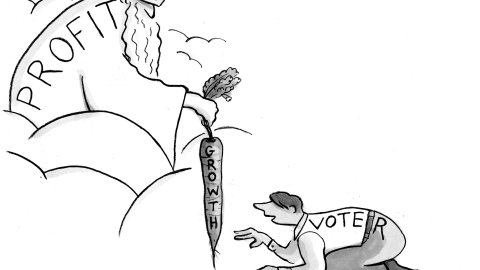Does The West’s Way of Life Face One “Last Chance”?

1. The West’s way of life has one “last chance,” notes Edward Luce in his insightful new book The Retreat of Western Liberalism.
2. The logic of its two great allied engines—democracy and market economics—is cracking apart.
3. Though “we are taught to think our democracies are held together by values,” Luce declares, “…liberal democracy’s strongest glue is economic growth.” But will liberty-loving “values” weaken if growth falters?
4. Despite ongoing trickle-down soothsaying, “the West’s median income… has barely shifted” in 50 years of strong overall growth.
5. The West’s “left-behinds” can see their material (+moral) interests ebbing (see Peter Turchin on macro-history of immiseration, not inequality, causing political instability, + “counter dominant coalitions“).
6. Meanwhile, many free-marketeers brandish Branko Milanović’s “Elephant Chart,” trumpeting that globalization has “lifted” billions out of poverty. Wonderfully true, but don’t kid yourself. For many capitalists that’s an incidental byproduct they’d happily jettison (their gospel-of-greed alchemy prioritizes only profits).
7. Luce notes much “unapologetic ignorance of history” among democracy-plus-markets evangelists.
8. Historically, “democracies” resisted the “will of the people.” Votes for all took decades-long fights (the idea of insta-democracy transitions would be laughable if they weren’t deadly).
9. And don’t forget India’s historic free-market “genocide.” Late Victorian Holocausts details 12 to 29 million starvation deaths due to the “imposition of free-market economics” by British rulers.
10. They exported grain and criminalized aid (claiming interference with market prices). Their Anti-Charitable Contributions Act created labor camps with fewer daily calories than Buchenwald. The Economist’s market-loving liberals called it unreasonable to expect the authorities “to keep [Indians] alive.”
11. Grain was “pulled to greater purchasing power,” Amartya Sen charitably explains. But that sugarcoats what let-the-market-decide ethics means. Unhindered markets mean no matter your need for X, if others can pay more, they get X. Fine for handbags, but life-saving meds? Or sustenance during famine?
12. Today’s free-market growth-as-glue mindset stokes a virulent self-over-civic antipolitics. But elevating private gain over public good forgets that the former is built on the latter. And vice versa (see Pericles).
13. This civics-weakening selfward turn triumphed under Reagan’s embrace of Milton Friedman’s ideas. This laughably labelled “values-free” economics-as-politics aimed to dissolve difficult politics into personal choices in self-prioritizing markets. Liberty, recast as market choice, became bipartisan doctrine (neoliberal). But profits often don’t prioritize well (e.g. seeking the next Viagra, over superbug defenses).
14.“Washington Consensus” experts (the World Bank, IMF) preached this defer-to-markets gospel globally. Seduced, or coerced into compliance, many nations suffered (e.g. generating Russia’s oligarchy).
15. Meanwhile, China’s authoritarian growth offers a “Beijing Consensus” template to other nations.
16. It was once self-evident that “we the people” had civic duties to our nation and to each other. But Luce detects a shift among “top-folks,” weakening national loyalty, strengthening transnational ties (to Davos titans and their McKinsey-speak wielding courtiers, Luce quips this inverts Marx “overlords of the world unite”).
17. The “divine right of kings”—>the “will of the people”—>a divine right of markets (and their profit kings). But Luce notes, what’s good for market kings like Apple isn’t always good for America.
18. Or any nation’s domestic health. As many free-market promoters compete to flatter transnational market kings, for instance by recasting corporate “self-interest” to exclude contributions to infrastructure and common goods.
19. Are democracy and markets ends in themselves? Perhaps risky and empty ends if they mean prioritizing lifestyle goods over alleviating suffering (while the world cooks).
20. Where once we ran economies to serve nations, now we run nations to serve the global economy (and its profit-uber-alles religion).
Illustration by Julia Suits, The New Yorker cartoonist & author of The Extraordinary Catalog of Peculiar Inventions





